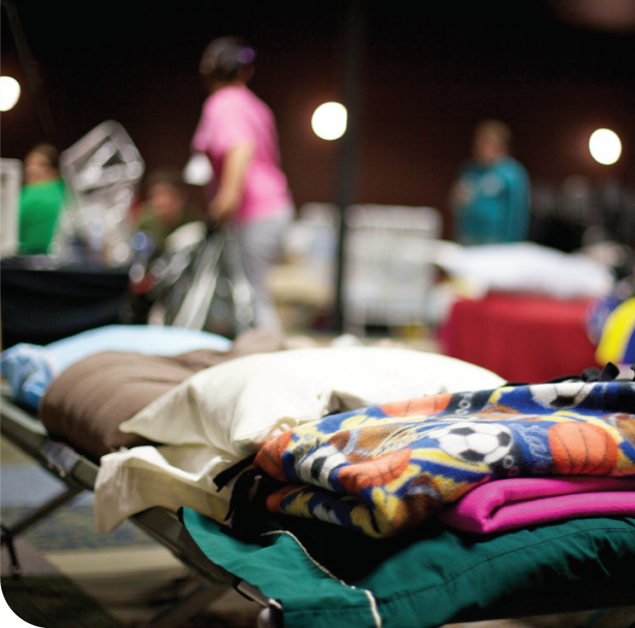Sheltering During the COVID-19 Pandemic
Planning and preparing communities for hurricanes and other natural disasters can be stressful and complex, more so during the current COVID-19 pandemic. In 2020, the Centers for Disease Control and Prevention (CDC) conducted two online surveys to assess people’s attitudes and behaviors related to going to a disaster shelter during the COVID-19 pandemic. Key highlights from the survey results are presented below.
The survey was conducted in June 2020, with 500 respondents aged 18 years and older from across the country.
The answers below were the most frequently stated reasons that could prevent someone from going to a shelter during an extreme weather incident:
- Worried about becoming infected with COVID-19 (52%)
- Concerned about leaving pets or valuables in the house (43%)
- No information about location and hours of operation (31%)
The most frequently stated methods for obtaining information about where to shelter during an extreme weather incident were the following:
In October 2020, CDC surveyed 3,000 adults living in coastal counties in eight states along the Gulf and Atlantic coasts that have recently experienced multiple hurricanes: Texas, Louisiana, Mississippi, Alabama, Florida, Georgia, South Carolina, and North Carolina.
Only 28% of respondents indicated that they had made changes to their emergency response plans because of the COVID-19 pandemic. Of those who made changes to their plans, 88% said they would not go to a shelter.
People had the following top concerns about going to a hurricane shelter during the COVID-19 pandemic:
- Other people making them sick (82%)
- Being unable to practice social distancing (81%)
- Other people not wearing masks (80%)
- Concern that older family members would get COVID-19 (76%)
- Inadequate facilities for pets (61%)
- Concern about leaving pets behind (60%)
(Percentages indicate the percent of respondents who said they were “very” or “somewhat” concerned about a particular issue.)
Respondents indicated the following factors would make them more likely to go to a hurricane shelter during the COVID-19 pandemic:
- Requiring masks be worn inside the shelter (42%)
- Using hotels as shelters (40%)
- Keeping distance between different households (38%)
- Having adequate soap and hand sanitizer (36%)
- Providing masks (36%)
- Availability of medical care in the shelter (36%)
- Availability of COVID-19 tests (35%)
The top reasons why people would go to a shelter instead of staying home were the following:
- Concerned about personal safety at home (85%)
- Concerned about losing electricity at home (74%)
- Concerned about flooding at home (73%)
(Percentages indicate the percent of respondents who said they were “very” or “somewhat” concerned about a particular issue.)
These were the top sources of communication:
Additionally, 85% of those who reported receiving emergency alerts reported receiving text alerts.
- CDC Interim Guidance for General Population Disaster Shelters During the COVID-19 Pandemic: https://www.cdc.gov/coronavirus/2019-ncov/downloads/Guidance-for-Gen-Pop-Disaster-Shelters-COVID19.pdf [PDF – 554 KB]
- Natural Disasters & COVID-19: Resources for Professionals & Emergency Workers: https://www.cdc.gov/disasters/covid-19/covid-19_resources_for_professionals.html
- Hurricanes and COVID-19: https://www.cdc.gov/disasters/hurricanes/covid-19/prepare-for-hurricane.html
- Hurricanes and Other Tropical Storms: https://www.cdc.gov/disasters/hurricanes
